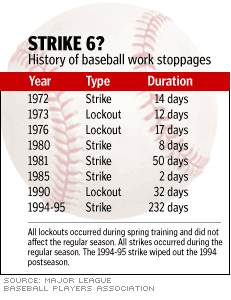NEW YORK (CNN/Money) - Major League Baseball players set an Aug. 30 strike date Friday, as the optimism of earlier this week for a quickly negotiated settlement collapsed.
The strike date does not necessarily mean there will be the ninth work stoppage in the sport's history. It will establish a deadline for negotiators on the two sides to try to reach an agreement to avoid a disruption of play.

The union issued a statement that said 57 players, including union representatives from the 30 major league teams, voted unanimously to set the Aug. 30 date. It said the union is willing to meet and bargain with the owners' representatives until an agreement is reached. The two sides are scheduled to return to the bargaining table Saturday.
The Aug. 30 date gives negotiators two weeks to reach an agreement, and also gives negotiators about a week and a half after the start of a strike to reach agreement so the sport can resume by the anniversary of the Sept. 11 terrorist attack, which is seen as symbolically important. While some strikes in baseball have gone on for weeks, three of the five previous strikes lasted for two weeks or less.
When the players bucked expectations and did not set a strike date Monday, both sides spoke of hopes of being able to reach agreement as soon as the end of this week. That would have been the first labor agreement ever reached without either a strike or management lockout. So the setting of a strike date is a clear sign that talks have lost their earlier momentum.
"Last Monday, the board (of the players union) decided not to set a strike date in the hope that progress this week would lead to an agreement with the owners. Unfortunately, that did not happen," said the union's statement.
Representatives of the owners said they are optimistic an agreement can still be reached, and tried to characterize the two sides as very close to a deal despite the differences and Friday's union action.
"We are disappointed obviously that the union decided today to set a strike date," said Rob Manfred, the owner's chief negotiator. "Our hope had been that we could get an agreement with the players without the players taking this step that causes such concern to so many of our fans. Our disappointment is magnified by the fact that as a result of compromises by both sides we made substantial progress towards a new agreement over the past weeks. A number of important issues have been resolved and we are close on many others."
But while ownership tried to characterize talks as productive and close to an agreement, the setting of a strike date is a set back to the agreement. Manfred admitted earlier this week that the setting of a strike date is a significant step in negotiations and one he hoped to avoid.
"I feel pressure to get something done in advance of the time what I regard as key events take place -- the setting of a strike date, a strike itself," he said in a call to reporters Tuesday night.
| |
 Related stories
Related stories
| |
| | |
| | |
|
The issue causing the problem is a so-called "luxury tax," an internal penalty that MLB would impose on teams with the largest player payrolls.
"For us to make a deal, there has to be a luxury tax in it," said Manfred.
But the players are opposed to the concept of a tax, and their proposal on a tax would do relatively little to discourage many if not most of the large-revenue, large-payroll teams from spending on top players.
The players agreed to a luxury tax as part of an agreement reached in 1996, following the 1994-1995 strike that wiped out the 1994 World Series. But that luxury tax had a moving threshold that led to relatively little penalties being paid by the top-spending teams.
"The tax mechanism in the last basic agreement would not be acceptable to us this time around," said Manfred.
Baltimore Orioles Owner Peter Angelos told reporters that the two sides had basically agreed on an increase in the sharing of local revenues, such as television broadcast rights and ticket sales, and now was stuck on the issue of a luxury tax.
"That does not preclude a given club from going beyond that level," said Angelos. "We believe it's time to get this spiraling payroll situation under some control. The idea is to stabilize.... We believe that in order to keep the game within reach of American baseball fan we have to do some payroll stabilization here."
Angelos' remarks were echoed by other management executives.
"It seems to me we have just one more hurdle to over come, and that's really to what extend we tax the game's highest payroll," said Chicago Cubs President Andy McPhail.
Angelos said the clubs want the tax to kick in if payrolls rise above $100 million, and cost teams 50 cents for every additional dollar of player pay over that level. Six clubs currently go above that pay level. But the players don't want the luxury tax to go into effect until a team's payroll next year reaches $130, which would currently only affect the New York Yankees, the team with the largest payroll. In 2004 he said the union wants the luxury tax to not take effect until a team's payroll reaches $140 million, and the $150 million in the 2005 season.

|

